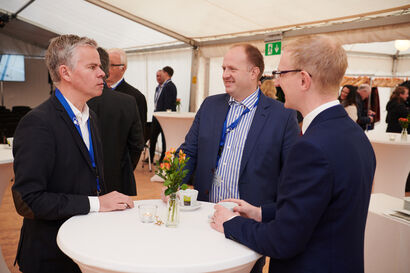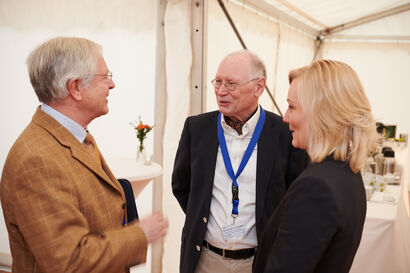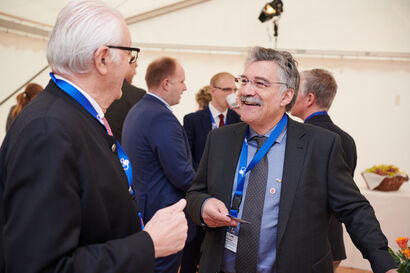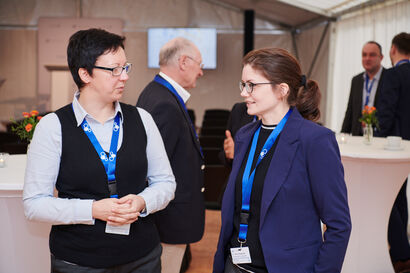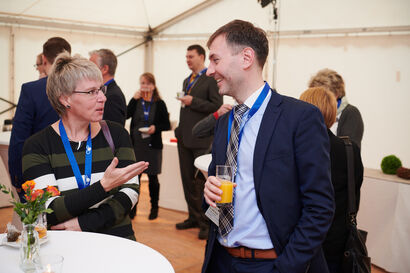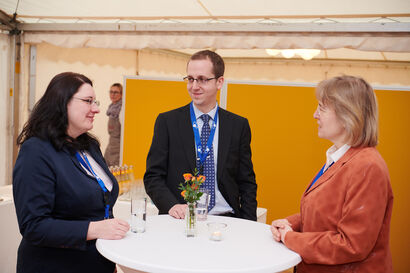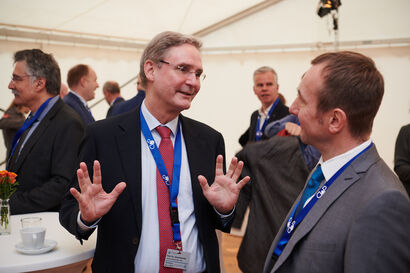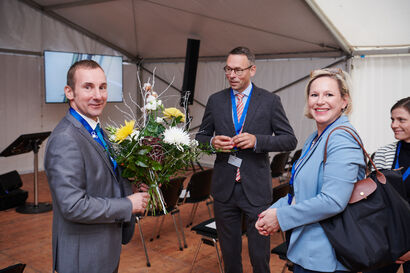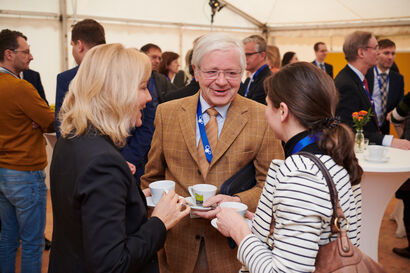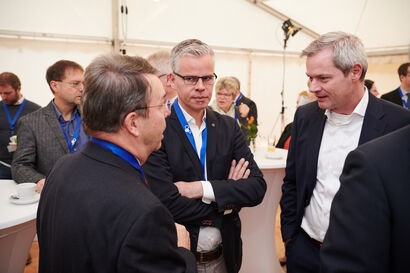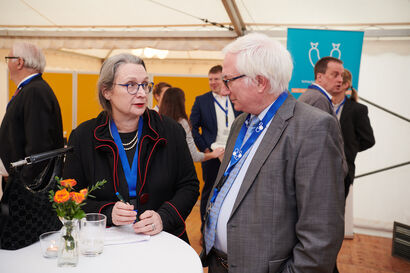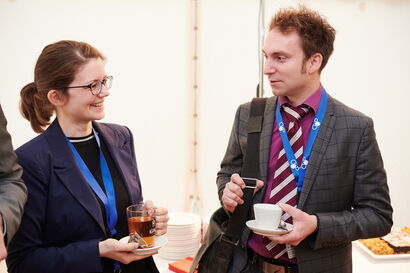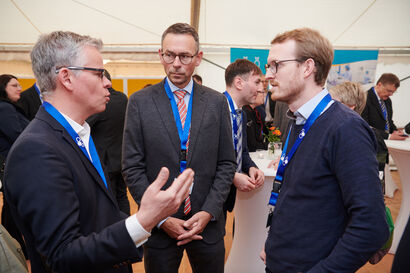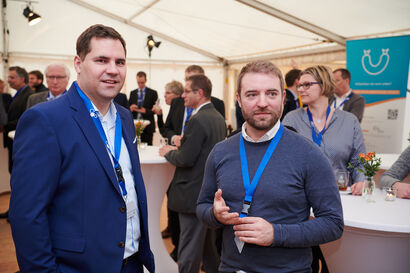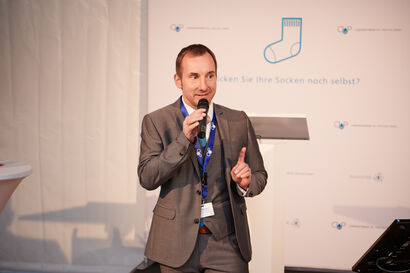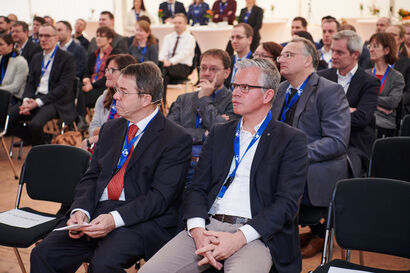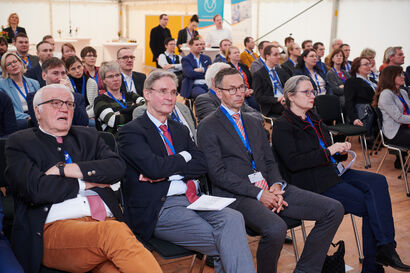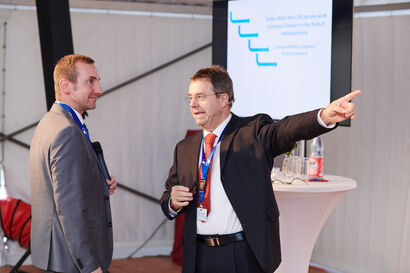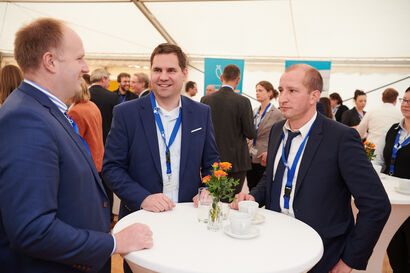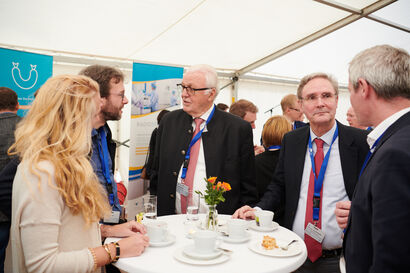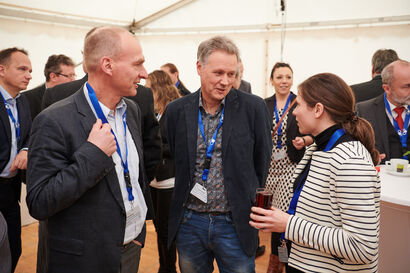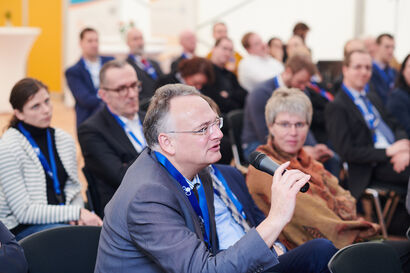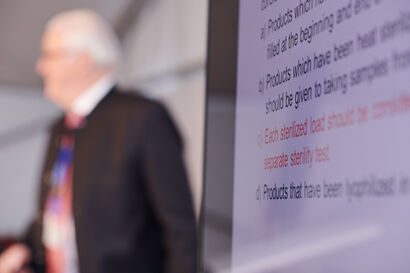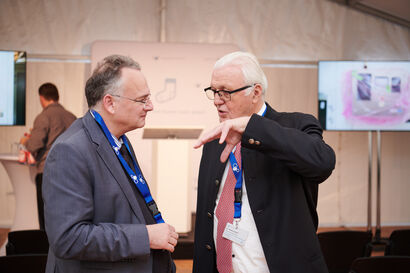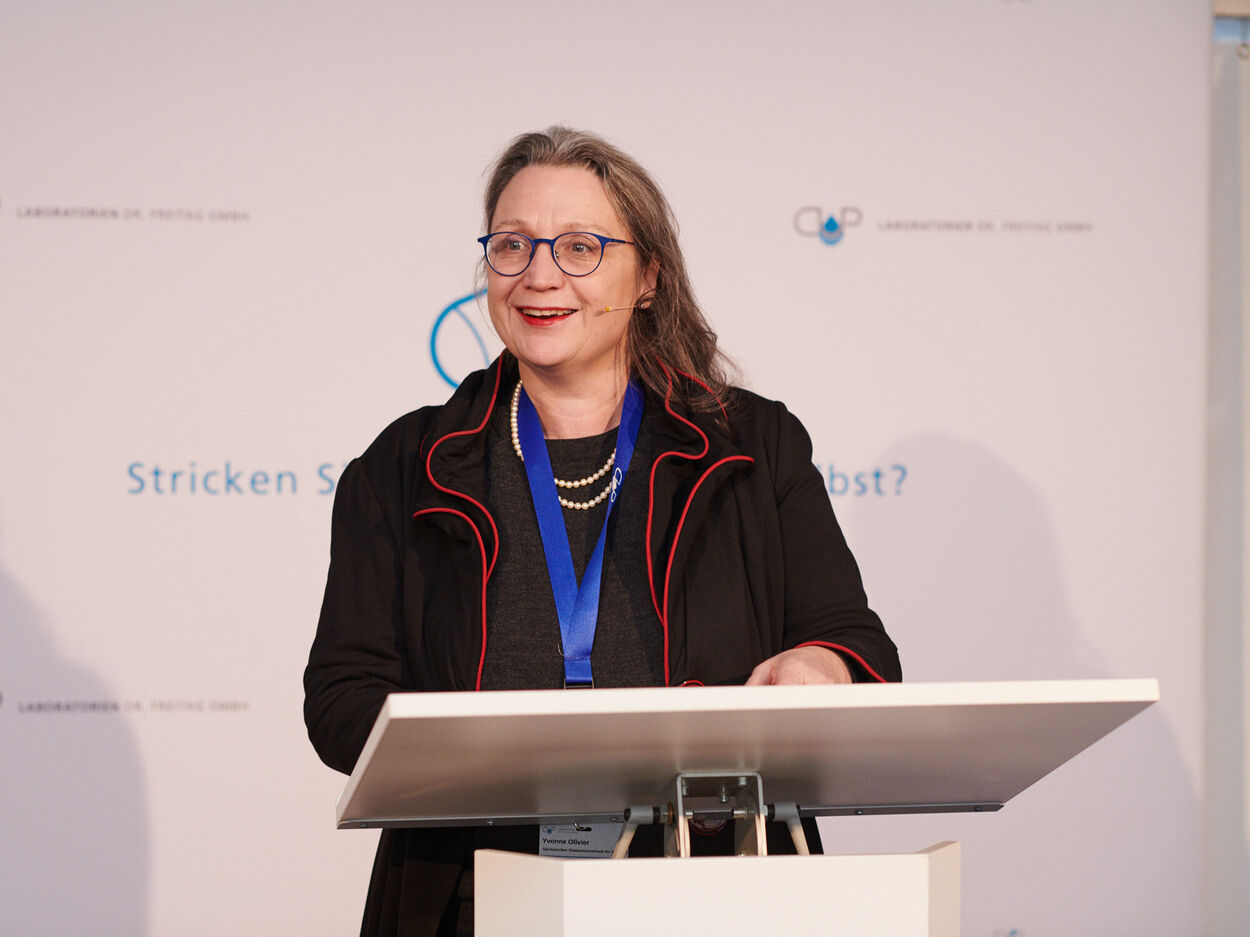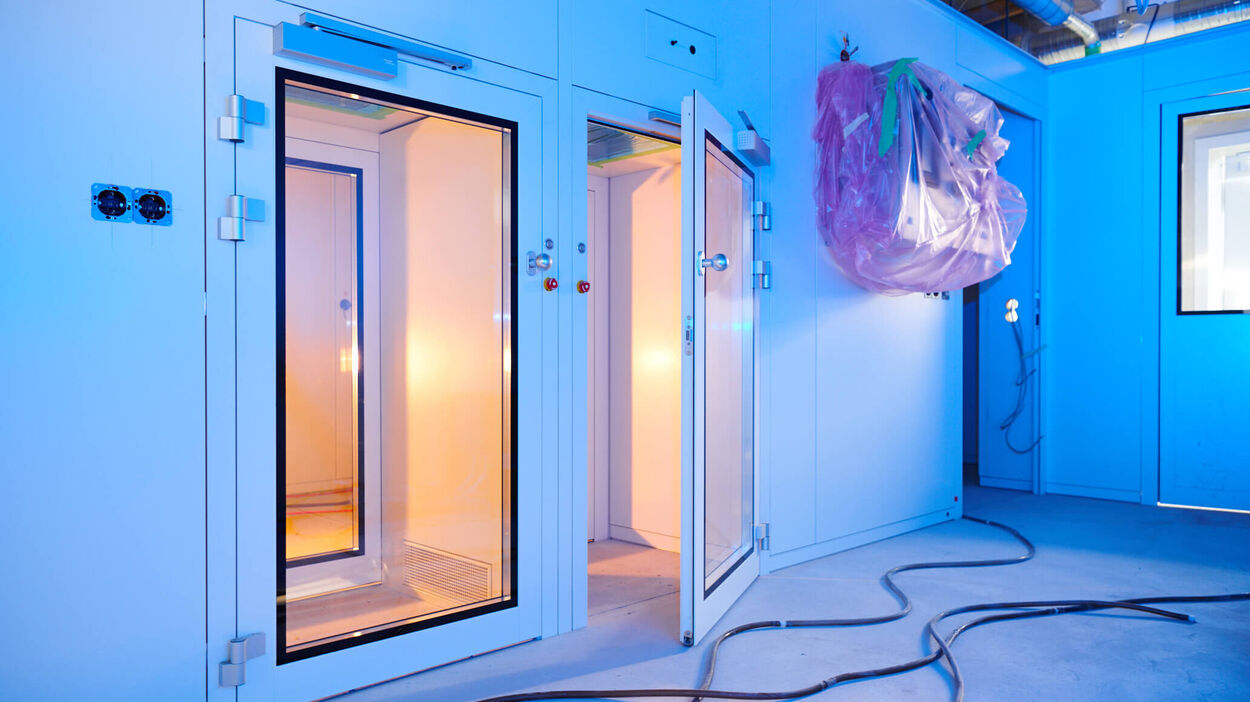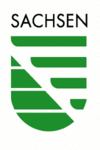Review
On 26.11.2019 the CUP Laboratories in Radeberg celebrated a late topping-out ceremony for an extension project. From March 2020, Sterility Testing of active radiopharmaceuticals is to be carried out in this ultra-modern building.
At the same time, the employees of the CUP Laboratories and their guests looked back on ten successful years of GMP analysis at the Radeberg site and also took a look into the future.
The event was characterized by excellent speakers.
The first speaker was Prof. Dr. Jörg Steinbach, who dealt with the development of radiopharmacy in Dresden-Rossendorf. In addition, Prof. Steinbach symbolically passed on the baton of the head of the Institute for Radiopharmaceutical Cancer Research at the HZDR to Prof. Dr. Klaus Kopka and called on the representatives from industry, science and politics present to establish a "Radiopharmaceutical Valley" in the greater Radeberg area. This ball was recorded by both Prof. Kopka and Jens Junker (Managing Partner of ROTOP Pharmaka GmbH). In their presentations, both speakers dealt with the successful model of cooperation between science and industry and the great opportunities in radiopharmacy, especially in the new therapeutic area.
The Federal Minister of Health, Jens Spahn, conveyed his greeting in the form of a video message and Mrs. Yvonne Olivier presented the greeting to the Saxon Minister of State for Social Affairs, Barbara Klepsch.
In the lunchtime session, Dr. Kati Zierenberg (GSK Biologicals), Dr. Helmut Wolf (HW Pharmaconsulting), Dr. Jakub Šimeček (ITG Garching) and PD Dr. Gerald Reischl (University Hospital Tübingen) discussed the topics of sterile production, sterile testing and radiopharmacy from different perspectives.
The CUP Laboratories would like to thank all guests who have made the event a great success, especially due to the intensive and interdisciplinary discussions during the breaks between lectures.
The event was culinarily accompanied by Schmidt´s Restaurant & Gourmetcatering.
PROGRAM
| 08.30 - 09:30 |
Arrival of guests |
| 09.30 - 10.45 |
Welcoming Aspects of the development of radiopharmacy in Dresden/ Rossendorf Greeting Greeting per Video Greetings from the Minister of State, Barbara Klepsch Together at the Top - Opportunities for SMEs through Cooperation with Science and Partner Companies |
| 10.45 - 11:15 |
Coffee break |
| 11.15 - 13.00 |
The development of GSK in Dresden News on Annex 1 of the EU GMP Guidelines Testing the sterility of 177Lu-labelled radiopharmaceuticals Validation of Self-Sealing and Particles for Closed-Vial-Filling of PET Parenteralia |
|
13.00 - |
Lunch - exchange at Fingerfood from Schmidt´s Restaurant |

Prof. Dr. Klaus Kopka
Director of the Institute of Radiopharmaceutical Cancer Research @ Helmholtz-Zentrum Dresden-Rossendorf (HZDR)
www.hzdr.deVita
Since the year 2013 Klaus Kopka held a full professorship position at the Ruprecht-Karls-University of Heidelberg, Germany, and was head of the Division of Radiopharmaceutical Chemistry of the German Cancer Research Center [DKFZ], Heidelberg, Germany. In 2019 he has accepted the call on a full professorship for Bioinorganic and Radiopharmaceutical Chemistry at Technical University Dresden [TUD], Germany, which is combined with the directorship of the Institute of Radiopharmaceutical Cancer Research at Helmholtz-Zentrum Dresden-Rossendorf [HZDR].
His current research interests focus on Radiopharmaceutical Sciences with focus on thera(g)nostic radiopharmaceutical drug development which bridges medicinal chemistry on oncologically relevant radiotracers with translational research in nuclear medicine. In the recent years, Klaus Kopka was mainly focused on the development of novel theranostic radiotracers targeting the prostate-specific membrane antigen (PSMA), i.e. PSMA-617 and PSMA-1007. The clinical translation of such highly promising new radiotracers is very important and can only be realised by state-of-the-art GMP-compliant production on-site, which is implemented at HZDR by available hot labs with clean room environment.
Klaus Kopka received his venia legendi (Habilitation) for the field Radiopharmaceutical Chemistry in the year 2007 at the Westfälische Wilhems-University of Münster, Germany. Since the year 2012 he is Chairman of the Working Group Radiochemistry / Radiopharmacy Committee (AGRR) of the German Society of Nuclear Medicine (DGN). The AGRR currently consists of more than 250 members, predominantly scientists from Radiochemistry and Radiopharmacy of Germany, Austria and Switzerland (D-A-CH region). Klaus Kopka was honoured in the year 2018 together with his colleagues Michael Eisenhut, Matthias Eder und Uwe Haberkorn with the highly recognized “The Stifterverband Science Award – Erwin Schrödinger Prize” of the Helmholtz Association of German Research Centres. Klaus Kopka is author and co-author of more than 160 quotable publications (Web of Science) and inventor and co-inventor of more than 10 patents, mainly dealing with the development of new PET tracers and radiopharmaceuticals for non-invasive thera(g)nostics in vivo. He is the radiopharmaceutical coordinator of the ongoing prospective multi-center clinical trial (IIT, phases-I/-II, >150 of 173 patients recruited) within the German Cancer Consortium (DKTK) using [68Ga]Ga-PSMA-11.
At HZDR Klaus Kopka will concentrate on the development and translation of new classes of oncologically relevant radiotracers for early detection and theranostic treatment of cancer.

Priv.-Doz. Dr. rer. nat. Dipl. Chem. Gerald Reischl
Head of the Radiopharmacy within the Department of Preclinical Imaging and Radiopharmacy at the University Hospital of Tübingen (UKT)
www.medizin.uni-tuebingen.deVita
Gerald Reischl is Head of the Radiopharmacy within the Department of Preclinical Imaging and Radiopharmacy at the University Hospital of Tübingen (UKT), Germany. After his Ph. D. in Organic Chemistry, he joined the radiopharmacy group of UKT as research fellow in 1996. During a research sabbatical at the Peter MacCallum Cancer Institute, Melbourne, Australia in 2005 he worked on the evaluation of PET hypoxia biomarkers. G. Reischl received the venia legendi (habilitation) in radiopharmaceutical sciences from the Medical Faculty, UKT in 2009. In 2012 an expert mission for IAEA to the Nuclear Research Centre (IPEN) São Paulo, Brazil, followed. Another research visit at the Austin Health, University of Melbourne brought him back to Australia in 2013.
His scientific focus within radiopharmaceutical sciences covers PET isotope production methods, PET tracer development of small molecules and antibodies, imaging of hypoxia / inflammation / infectious diseases, preclinical evaluation and especially translation of new radiotracers under GMP into clinical application. He is author and co-author of more than 100 publications in international peer-reviewed journals. Besides, he has continuously been involved in teaching in radiochemistry and -pharmacy at UKT.
Gerald Reischl is member of the Managing Board of the Consortium “Radiochemistry / Radiopharmacy” within the German Society of Nuclear Medicine (DGN) and chair of the “Consortium Radiopharmacy” of the German Pharmaceutical Society (DPhG). He is part of the Editorial Board of the journal “Applied Radiation and Isotopes” and reviewer for several journals dealing with radiopharmaceutical sciences and nuclear medicine.
Vita
Jakub Simecek graduated from Charles University in Prague, Faculty of natural sciences, with focus on bioinorganic and coordination chemistry (2010). He obtained doctoral degree at the Technical University in Munich (2014) after conducting pioneering work in the radiometallation field (Ga-68, Cu-64, Lu-177 and Zr-89) followed by bench-to-bedside projects using PET probes predominantly dedicated to nuclear oncology. On the radiotherapeutic field, he co-developed one of the first 177Lu-labelled PSMA inhibitors that are utilised in nuclear medicine practice today. After that he moved to industry dealing with automation in GMP production of PET and therapeutic radiopharmaceuticals and established production of novel nuclear targeting agents in numerous radiopharmacies around the globe. In 2016 he joined Isotope Technologies Garching and worked at different positions, currently as Head of Operational Sales. Recently he has been implementing the preparation of alpha-radiotherapeutics based on Ac-225 in various centers; became a member of European Society for Medical Oncology.
Vita
• Senior Scientist – Helmholtz-Zentrum Dresden-Rossendorf e.V. Institute of Radiopharmaceutical Cancer Research
• Senior Consultant – ROTOP Radiopharmacy GmbH, Dresden
Research topics:
Radiochemistry and radiopharmacy, Radionuclide production, Targeted radionuclide therapy, Development of new radiotracers and radiopharmaceuticals for imaging of biological functions (Focus: cancer and neurodegenerative diseases)
Scientific Experience:
Radiochemical and radiopharmaceutical developments for Positron Emission Tomography and endoradionuclide therapy, Labelling techniques, Targetry for production of radionuclides
Professional Appointments:
2005 - 2018
Director, Institute of Radiopharmaceutical Cancer Research, Helmholtz-Zentrum Dresden-Rossendorf e.V., Full Professor for Bioinorganic and Radiopharmaceutical Chemistry at Technische Universität Dresden, Lecturer at ETH Zürich, EANM-Course Radiopharmacy
2001- 2009
Director, Institute of Interdisciplinary Isotope Research, Leipzig Full Professor for Isotope Research, Universität Leipzig
1992 – 2001
Head of PET-Department, Institute of Bioinorganic und Radiopharmaceutical Chemistry, Forschungszentrum Dresden- Rossendorf
1982 – 1991
Scientist, Central Institute of Nuclear Research Rossendorf, Department of Radioactive Isotopes
Publications:
More than > 200 scientific publications in peer reviewed journals, contributions to monographs 2006)
Vita
Dr. Helmut Wolf studied chemistry and process engineering at TU Munich. After completing his studies, he began his career at Schering AG (now Bayer) in Berlin. The focus of his professional interest has always been the development and production of active pharmaceutical ingredients and sterile pharmaceutical formulations. During this industrial activity he held various responsible management positions in development, production, quality control and quality assurance up to managing director functions, before becoming self-employed in 1996 and working as shareholder and managing director on the foundation, development and strategic development of new companies. In the course of his professional career, Dr. Wolf held various positions of responsibility in companies in Germany, France, Italy, Switzerland, India, China and the USA.
At the end of August 2019, Dr. Helmut Wolf ended his full-time career at Lyocontract, a contract manufacturer for sterile formulations in Ilsenburg, Saxony-Anhalt, and is now working as a freelance consultant.
Vita
Dr. Kati Zierenberg has been Site Quality Head at the GSK site in Dresden since January 2017 and thus took over the management of the Quality Unit (Q) consisting of the areas of Quality Assurance (QA) and Quality Control (QC). Independent Quality Units are established throughout the GSK Vaccines network to guarantee a strong partnership between production and quality at eye level - in the patient's interest to reliably provide high-quality vaccines.
Dr. Kati Zierenberg is a veterinarian and holds a PhD in virology. The latter was her entry into the pharmaceutical industry. In 2000 she joined GSK as a research associate and in the following years was involved in various functions such as project manager for genetic engineering, head of process development, head of virology and seed laboratory and head of quality control and development in the development of various vaccines.





